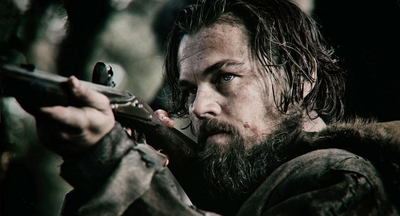
BY ZACHARY WIGON |
Racking Focus: 'Under The Skin' Abandons Storytelling (In a Good Way)
Jonathan Glazer's first film in ten years is one movie that is nothing like TV.

With the collapsing of formats being quite de rigueur these days, what with transmedia storytelling and more crisscrossing adaptations than ever before - film to TV, web series to film - not to mention the viewing of films and TV and web series on the same devices, it's easy to assume that all visual entertainment can be boiled down to one common denominator: story. Whether on the big screen or an iPhone, or anywhere in between, it's stories than transfix eyeballs and coax audiences to pay for their entertainment.
Arriving like a fresh, blazingly strong refutation of this idea, Jonathan Glazer's masterful Under The Skin, which opened this past Friday in a whirl of critical adulation and cinephile anticipation (it's his first picture in ten years, since the beloved but woefully underseen Birth), leaves no doubt that cinema possesses some qualities that are markedly distinct from the idea of storytelling (in the TV and web series-friendly manner in which that term is used to conflate these different mediums). Visually rhapsodic, Under The Skin has a gentle skeleton of a story, but what makes this sublime film stand apart from what you might find in other formats is its insistence on the exploration of visuals - particularly, abstract visuals - as a kind of storytelling that has nothing to do with conventional elements like dialogue or plot.
It's the film's simplicity of narrative - combined with the striking nature of its visuals - that allows it to pack such an insightful punch.
The film stars Scarlett Johansson as an alien who picks up and entraps men in Scotland, harvesting their bodies for a nefarious purpose. Yet the film isn't really a sci-fi movie and has little to do with its own "storyline" - this isn't a film where we'll see the alien race developed or some sort of grand evil plan begin to hatch. The above premise is really a jumping-off point that allows Glazer to represent life on earth through a formalism that is detached, foreign - naturally, alien.
It's the sort of work that deserves to never be experienced outside of a movie theater.
In so doing, he renders something poignant about the manner in which we humans proceed with our lives here on earth, ourselves outsiders to cultures and societies that we do our best to fit into, with mixed results. It's a kind of story, rich in affects and sensations, that couldn't be told through a series of plot twists or via a complex web of characters. It's the film's simplicity of narrative - combined with the striking nature of its visuals - that allows it to pack such an insightful punch.
Under The Skin takes its time, and is less interested in telling you a story than in allowing you to construct a story from the images you've been presented with. In other words, it's a great work of art cinema, bolstered by breathtaking visuals - a macroscopic close-up of an ant, a toddler crying alone on a dark beach, a man walking into a pool of inky nothingness. It's the sort of work that deserves to never be experienced outside of a movie theater. A lot of films made today feel like TV shows, and a lot of TV shows feel like movies, but sometimes works of singular vision remind us that there are distinctions, after all.

